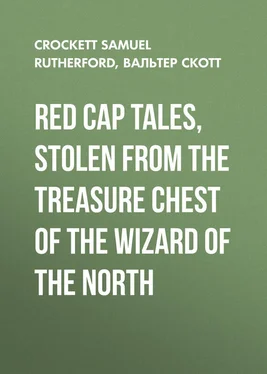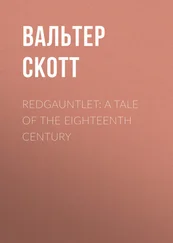Вальтер Скотт - Red Cap Tales, Stolen from the Treasure Chest of the Wizard of the North
Здесь есть возможность читать онлайн «Вальтер Скотт - Red Cap Tales, Stolen from the Treasure Chest of the Wizard of the North» — ознакомительный отрывок электронной книги совершенно бесплатно, а после прочтения отрывка купить полную версию. В некоторых случаях можно слушать аудио, скачать через торрент в формате fb2 и присутствует краткое содержание. Жанр: foreign_prose, foreign_antique, на английском языке. Описание произведения, (предисловие) а так же отзывы посетителей доступны на портале библиотеки ЛибКат.
- Название:Red Cap Tales, Stolen from the Treasure Chest of the Wizard of the North
- Автор:
- Жанр:
- Год:неизвестен
- ISBN:нет данных
- Рейтинг книги:4 / 5. Голосов: 1
-
Избранное:Добавить в избранное
- Отзывы:
-
Ваша оценка:
- 80
- 1
- 2
- 3
- 4
- 5
Red Cap Tales, Stolen from the Treasure Chest of the Wizard of the North: краткое содержание, описание и аннотация
Предлагаем к чтению аннотацию, описание, краткое содержание или предисловие (зависит от того, что написал сам автор книги «Red Cap Tales, Stolen from the Treasure Chest of the Wizard of the North»). Если вы не нашли необходимую информацию о книге — напишите в комментариях, мы постараемся отыскать её.
Red Cap Tales, Stolen from the Treasure Chest of the Wizard of the North — читать онлайн ознакомительный отрывок
Ниже представлен текст книги, разбитый по страницам. Система сохранения места последней прочитанной страницы, позволяет с удобством читать онлайн бесплатно книгу «Red Cap Tales, Stolen from the Treasure Chest of the Wizard of the North», без необходимости каждый раз заново искать на чём Вы остановились. Поставьте закладку, и сможете в любой момент перейти на страницу, на которой закончили чтение.
Интервал:
Закладка:
While Miss Rose ran off to make some changes in her dress, the Baron conducted Edward into a hall hung about with pikes and armour. Four or five servants, in old-fashioned livery, received them with honour, the majordomo at their head. The butler-gardener was not to be caught napping a second time.
Bradwardine took Captain Waverley at once into an old dining room all panelled with black oak, round the walls of which hung pictures of former chiefs of the line of Tully-Veolan. Somewhere out-of-doors a bell was ringing to announce the arrival of other guests, and Edward observed with some interest that the table was laid for six people. In such a desolate country it seemed difficult to imagine where they would arrive from.
Upon this point Edward soon received enlightenment. First, there was the Laird of Balmawhapple,—"a discreet young gentleman," said the Baron, "much given to field sports." Next came the Laird of Killancureit, who cultivated his own fields and cared for his own cattle—thereby (quoth the Baron) showing the commonness of his origin. Added to these were a "non-juring" Episcopal minister—that is, one who had refused to take the oaths of allegiance to King George's government, and, last of all, the "Baron-Bailie" or land-steward of Bradwardine, one Mr. Macwheeble.
This last, to show his consciousness of his inferior position, seated himself as far as possible from the table, and as often as he wanted to eat, he bent himself nearly double over his plate, in the shape of a clasp-knife about to shut. When dinner was over, Rose and the clergyman discreetly retired, when, with a sign to the butler, the Baron of Bradwardine produced out of a locked case a golden cup called the Blessed Bear of Bradwardine, in which first the host and then all the company pledged the health of the young English stranger. After a while, the Baron and Edward set out to see their guests a certain distance on their way, going with them down the avenue to the village "change-house" or inn, where Balmawhapple and Killancureit had stabled their horses.
Edward, being weary, would much rather have found himself in bed, but this desertion of good company the Baron would noways allow. So under the low cobwebbed roof of Lucky Macleary's kitchen the four gentlemen sat down to "taste the sweets of the night." But it was not long before the wine began to do its work in their heads. Each one of them, Edward excepted, talked or sang without paying any attention to his fellows. From wine they fell to politics, when Balmawhapple proposed a toast which was meant to put an affront upon the uniform Edward wore, and the King in whose army he served.
"To the little gentleman in black velvet," cried the young Laird, "he who did such service in 1702, and may the white horse break his neck over a mound of his making!"
The "little gentleman in black velvet" was the mole over whose hillock King William's horse is said to have stumbled, while the "white horse" represented the house of Hanover.
Though of a Jacobite family, Edward could not help taking offence at the obvious insult, but the Baron was before him. The quarrel was not his, he assured him. The guest's quarrel was the host's—so long as he remained under his roof.
"Here," quoth the Baron, "I am in loco parentis to you, Captain Waverley. I am bound to see you scatheless. And as for you, Mr. Falconer of Balmawhapple, I warn you to let me see no more aberrations from the paths of good manners."
"And I tell you, Mr. Cosmo Comyne Bradwardine of Bradwardine and Tully-Veolan," retorted the other, in huge disdain, "that I will make a muir cock of the man that refuses my toast, whether he be a crop-eared English Whig wi' a black ribband at his lug, or ane wha deserts his friends to claw favour wi' the rats of Hanover!"
In an instant rapiers were out, and the Baron and Balmawhapple hard at it. The younger man was stout and active, but he was no match for the Baron at the sword-play. And the encounter would not have lasted long, had not the landlady, Lucky Macleary, hearing the well-known clash of swords, come running in on them, crying that surely the gentlemen would not bring dishonour on an honest widow-woman's house, when there was all the lee land in the country to do their fighting upon.
So saying, she stopped the combat very effectually by flinging her plaid over the weapons of the adversaries.
Next morning Edward awoke late, and in no happy frame of mind. It was an age of duels, and with his first waking thoughts there came the memory of the insult which had been passed upon him by the Laird of Balmawhapple. His position as an officer and a Waverley left him no alternative but to send that sportsman a challenge. Upon descending, he found Rose Bradwardine presiding at the breakfast table. She was alone, but Edward felt in no mood for conversation, and sat gloomy, silent, and ill-content with himself and with circumstances. Suddenly he saw the Baron and Balmawhapple pass the window arm in arm, and the next moment the butler summoned him to speak with his master in another apartment.
There he found Balmawhapple, no little sulky and altogether silent, with the Baron by his side. The latter in his capacity of mediator made Edward a full and complete apology for the events of the past evening—an apology which the young man gladly accepted along with the hand of the offender—somewhat stiffly given, it is true, owing to the necessity of carrying his right arm in a sling—the result (as Balmawhapple afterwards assured Miss Rose) of a fall from his horse.
It was not till the morning of the second day that Edward learned the whole history of this reconciliation, which had at first been so welcome to him. It was Daft Davie Gellatley, who, by the roguish singing of a ballad, first roused his suspicions that something underlay Balmawhapple's professions of regret for his conduct.
"The young man will brawl at the evening board
Heard ye so merry the little birds sing?
But the old man will draw at the dawning the sword,
And the throstle-cock's head is under his wing. "
Edward could see by the sly looks of the Fool that he meant something personal by this, so he plied the butler with questions, and discovered that the Baron had actually fought Balmawhapple on the morning after the insult, and wounded him in the sword-arm!
Here, then, was the secret of the young Laird's unexpected submission and apology. As Davie Gellatley put it, Balmawhapple had been "sent hame wi' his boots full o' bluid!"
THE FIRST INTERLUDE OF ACTION
The tale-telling had at this point to be broken off. Clouds began to spin themselves from Eildon top. Dinner also was in prospect, and, most of all, having heard so much of the tale, the four listeners desired to begin to "play Waverley."
Sweetheart made a stately, if skirted, Bradwardine. Besides, she was in Cæsar , and had store of Latin quotations—mostly, it is true, from the examples in the grammar, such as " Illa incedit regina! " Certainly she walked like a queen. Or, as it might be expressed, more fittingly with the character of the Baron in the original:
"Stately stepped she east the wa',
And stately stepped she west."
Hugh John considered the hero's part in any story only his due. His only fault with that of Waverley was that so far he had done so little. He specially resented the terrible combat "in the dawning" between the Baron and the overbold Balmawhapple (played by Maid Margaret). Sir Toady Lion as low comedian ("camelion" he called it) performed numerous antics as Daft Davie Gellatley. He had dressed the part to perfection by putting his striped jersey on outside his coat, and sticking in his cricket cap such feathers as he could find.
"Lie down, Hugh John," he cried, in the middle of his dancing and singing round and round the combatants; "why, you are asleep in bed!"
Читать дальшеИнтервал:
Закладка:
Похожие книги на «Red Cap Tales, Stolen from the Treasure Chest of the Wizard of the North»
Представляем Вашему вниманию похожие книги на «Red Cap Tales, Stolen from the Treasure Chest of the Wizard of the North» списком для выбора. Мы отобрали схожую по названию и смыслу литературу в надежде предоставить читателям больше вариантов отыскать новые, интересные, ещё непрочитанные произведения.
Обсуждение, отзывы о книге «Red Cap Tales, Stolen from the Treasure Chest of the Wizard of the North» и просто собственные мнения читателей. Оставьте ваши комментарии, напишите, что Вы думаете о произведении, его смысле или главных героях. Укажите что конкретно понравилось, а что нет, и почему Вы так считаете.












